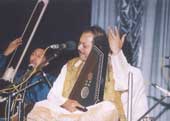
Towards the end of Bombay Velvet, Ranbir Kapoor’s Johnny Balraj enters a room with machine guns and lets the bullets rip. The mid close-up of his enraged face blazed by the fire of the gun shots in slow motion is a spitting image of Nawazuddin Siddiqui’s Faizal Khan unleashing his anger in the climax of Gangs of Wasseypur. Both the films are directed by Anurag Kashyap, but apart from that one deja vu feeling, it is (unfortunately) a tale of two movies.
Despite having the best of resources — an international studio, biggest of Bollywood stars and a seemingly bottomless budget — Kashyap fails to rustle up the kind of magic he’s done year after year with unknown faces and very little money. Perhaps the soul of Bombay Velvet got lost under the piles and piles of authentic production design and immaculate period detail, almost reminiscent of the other big disappointment of the year, Detective Byomkesh Bakshy!.
The writing (Kashyap, Vasan Bala, Gyan Prakash and Thani) is the biggest letdown here, even though Bombay Velvet has the oldest narrative arc in film history — an innocent love story between two down-and-outers against the backdrop of all things big and sinister. Those two would be Balraj (Ranbir Kapoor) and Rosie (Anushka Sharma), first shown as kids in shorts and frock in 1949, the year the Bombay Prohibition Act was passed.
Their stories streamed parallely, he grew up in Bombay with friend Chiman (Satyadeep Mishra) as a street thug while she grew up in Goa abused by the man (Remo Fernandez in a special appearance) who took her in to teach music. She lands up in Bombay after taking care of him and starts singing in bars and clubs.
In what is almost an outtake of Barfi!, where Balraj tries to rob a bank with a handkerchief over his finger, he meets Parsi newspaper owner Khambatta (Karan Johar) who spots the talent — long lusty stare at the Kapoor crotch — and instantly renames him Johnny! Things get bizarre-bizarrer-bizarrest as Khambatta opens a jazz club called Bombay Velvet for Johnny to run, used as a front to “talk shop” with the mayor (Siddhartha Basu) and acquire plots in the land reclaimed from the Bombay Back Bay.
Rosie becomes the voice of Bombay Velvet and falls in love with her seeker and protector — “main uska do not disturb sign hoon” — Johnny. Also in the mix is Jamshed Mistry (Manish Chaudhry) who runs another tabloid, has a thing for Rosie, and wants to bring down Khambatta. Anyway, the print fight between the two Parsis over Bombay land encroachment would have hardly affected the Johnny-Rosie romance had Balraj not wanted to be a “Big Shot” like James Cagney in The Roaring Twenties. That’s some cineaste gunda!

If the story is contrived and unnecessarily meandering, the storytelling is very un-Kashyap — dull, tame and lacking energy. Even the songs, which have always been Anurag’s strength in their conceptualisation and visualisation, are stodgy and the jazz numbers get to you after a point of time. And despite the effort and money that have been pumped in to recreate the Bombay of 1969, it doesn’t wow you like the Bombay of Mani Ratnam’s Guru did.
Ranbir tries hard to bring some life to the tired proceedings but the character is such a convenient paper job — stupid at times, cheeky at others, with a constantly changing list of priorities — that he can only do that much. It’s a pity to see such a fine young actor being misused again and again. And what is that hairstyle making him look like Flattop Jones from the Dick Tracy movie!
Apart from standing tall in those gorgeous gowns, Anushka does very little. That she has very few spoken lines in the initial part of the film is a good thing because when she suddenly goes into Band Baaja Baaraat mode in the romantic scenes later, all that period feel is instantly lost. Either the film’s schedules had long breaks in between or she just never got inside Rosie’s head.
The best thing about Bombay Velvet is Karan Johar. Ignoring his roly-poly presence in Dilwale Dulhania Le Jayenge, the film “introduces” the producer-director as an actor. And what a fine job KJo does playing the scheming gay media mogul with a troubled past. It’s a glorious departure from his self-conscious presence on the TV shows and every look and every move is beautifully measured. He also has the best scene of the film, where he steps out and helps himself to a loud laugh.
The two other moments in Bombay Velvet which bring you to your feet both belong to Raveena Tandon Thadani. Once at the start and somewhere towards the end, she takes the stage and stands behind the microphone, lip-syncing to the songs in a way only she can. Yes, even now.
But that’s not redeeming enough to spend 152 minutes of your life at Bombay Velvet. It will upset you if you are an Anurag Kashyap follower. It will depress you if you are an Anushka Sharma fan. It will kill you if you are a Ranbir Kapoor diehard. The two Kashyap brothers (remember Abhinav’s Besharam?) have managed to bring down the Big Shot Kapoor. Now it’s up to the other Anurag (Basu) to bring him back.
Pratim D. Gupta
Share a 50-word review of Bombay Velvet at t2@abp.in











